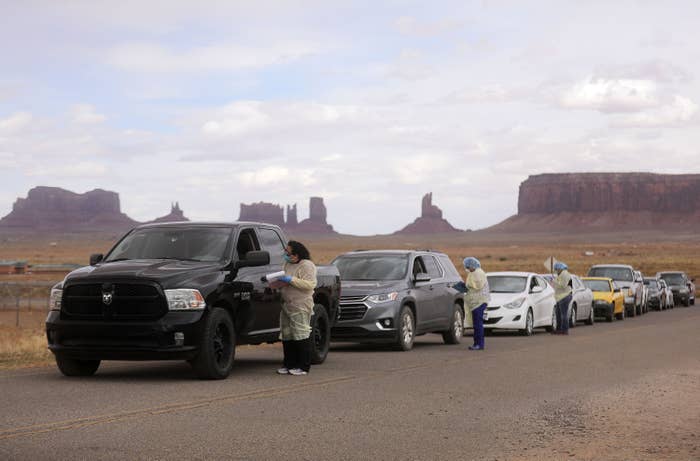A federal judge blocked the Treasury Department from sending coronavirus relief money meant to benefit Native American tribes to certain for-profit Native corporations.
Zoe TillmanBuzzFeed News Reporter
Reporting From Washington, DC Posted on April 27, 2020

Kristin Murphy / the Deseret News via AP
People line up to get tested for COVID-19 in Oljato-Monument Valley, Utah, April 16. The Navajo Nation has one of the highest per capita COVID-19 infection rates in the country.
WASHINGTON — The Trump administration cannot distribute coronavirus relief money intended to help Native American communities respond to the coronavirus pandemic to certain for-profit Native corporations, a federal judge ruled Monday evening.
It's the first loss in court for the government over how administration officials are managing the billions of dollars that Congress approved in the Coronavirus Aid, Relief, and Economic Security (CARES) Act. Dozens of tribal governments raced to court in the past two weeks to challenge the Treasury Department's decision to make Alaska Native Corporations (ANCs) eligible for $8 billion in funding set aside to benefit Native American tribes.
The tribal governments that sued argued that they stood to lose out on potentially millions of dollars if they had to share the pool with ANCs. The ANCs, established by a 1971 law governing how Alaska Natives manage and benefit from their land, have shareholders — primarily members of Native American tribes — and boards of directors, and they serve as holding companies for businesses that range from construction and pipeline maintenance to janitorial and food services. There are 574 federally recognized Native American tribes and 237 ANCs across Alaska, according to court papers.
Tribal governments argued they needed the money to deliver services to communities hit hard by COVID-19, the disease caused by the novel coronavirus, including providing health care, buying personal protective equipment, and delivering meals to the elderly and children. They asked the court to enter an immediate injunction since the Treasury Department was set to begin sending the money as early as April 28.
US District Judge Amit Mehta, who heard arguments last week, agreed with the tribal governments that ANCs didn't qualify as the type of "tribal government" that Congress referenced in approving the relief money. Under the definition of "tribal government" that Congress relied on in the CARES Act, the judge wrote, a tribal government had to be eligible for special programs provided by the US government to Native Americans, and it had to be formally recognized by the US government as the governing body of a tribe. The ANCs don't fall into those categories, he wrote.
Mehta noted that Congress put the language about funding for tribal governments in a section of the CARES Act dealing with other "governments," including states, the District of Columbia, Puerto Rico, the US Virgin Islands, Guam, the Commonwealth of the Northern Mariana Islands, and American Samoa.
"Reading the CARES Act to allow the Secretary to disburse Title V dollars to for-profit corporations does not jibe with the Title’s general purpose of funding the emergency needs of 'governments,'" he wrote.
“The Chehalis Tribe is pleased that the court saw what was obvious to many of us. Corporations have no place taking dollars that were allocated for tribal governments, period!” said Harry Pickernell, senior chair of the Chehalis Tribe, one of the tribal governments that sued. “This ruling will ensure that tribes and tribal members will reap the intended benefits that Congress envisioned in the CARES Act. This ruling will help tribal governments to lead in the aid and recovery of their people.”
The administration and an ANC that filed a friend-of-court brief argued that the corporations were in a position to deliver services to communities, even if they didn't have the same government-to-government relationship that federally recognized tribes do with the US government. Mehta wrote that no one had offered any evidence that ANCs are actually providing public services during the pandemic, however.
Mehta also rejected the administration's argument that the court shouldn't get involved in the case at all. The judge wrote that federal courts had a role to play in resolving disputes over how agencies interpret laws passed by Congress — in this case, what exactly Congress meant by using the term "tribal government." He also didn't accept the government's argument that the fact that the money was intended as "emergency" relief meant the court couldn't intervene.
"Thus, while the Secretary’s decisions as to how much to disburse might not be reviewable, his decisions concerning to whom to disburse those funds most certainly is," Mehta wrote, adding in a footnote that he wasn't saying a court couldn't review how much money the Treasury Department paid out in the future, either.
Although the judge blocked the administration from sending relief money to the corporations, he did not order the government to distribute the entire $8 billion pool to the federally recognized tribes. The government could award money to ANCs and hold onto it until the legal fight is over; the judge entered a preliminary injunction on Monday, which is not a final order.
The Treasury Department and Justice Department did not immediately return requests for comment.
If you're someone who is seeing the impact of the coronavirus firsthand, we’d like to hear from you. Reach out to us via one of our tip line channels.
MORE ON THIS https://plawiuk.blogspot.com/search?q=NAVAJO

Zoe Tillman is a senior legal reporter with BuzzFeed News and is based in Washington, DC.
SEE
https://plawiuk.blogspot.com/2020/04/native-american-tribes-say-theyre-at.html
https://plawiuk.blogspot.com2020/05/extreme/-lockdown-shows-divide-in-hard.html
https://plawiuk.blogspot.com/2020/05/usa-small-tribes-seal-borders-push.html
https://plawiuk.blogspot.com/2020/05/south-dakota-gov.html
https://plawiuk.blogspot.com/2020/05/trump-cant-mask-his-message-to-indian.html
No comments:
Post a Comment